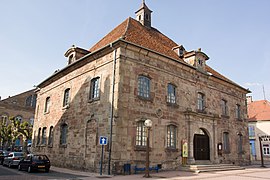Pfalzburg
| Phalsbourg | ||
|---|---|---|
| Commune | ||

Town hall of Phalsbourg, former Corps de Garde
|
||
|
||
| Coordinates: 48°46′N 7°16′E / 48.77°N 7.26°ECoordinates: 48°46′N 7°16′E / 48.77°N 7.26°E | ||
| Country | France | |
| Region | Grand Est | |
| Department | Moselle | |
| Arrondissement | Sarrebourg-Château-Salins | |
| Canton | Phalsbourg | |
| Government | ||
| • Mayor (2008–2014) | Dany Kocher | |
| Area1 | 13.15 km2 (5.08 sq mi) | |
| Population (2004)2 | 4,630 | |
| • Density | 350/km2 (910/sq mi) | |
| Time zone | CET (UTC+1) | |
| • Summer (DST) | CEST (UTC+2) | |
| INSEE/Postal code | 57540 /57370 | |
| Elevation | 200–384 m (656–1,260 ft) (avg. 380 m or 1,250 ft) |
|
| Website | http://www.phalsbourg.com/ | |
|
1 French Land Register data, which excludes lakes, ponds, glaciers > 1 km² (0.386 sq mi or 247 acres) and river estuaries. 2Population without double counting: residents of multiple communes (e.g., students and military personnel) only counted once. |
||
1 French Land Register data, which excludes lakes, ponds, glaciers > 1 km² (0.386 sq mi or 247 acres) and river estuaries.
Phalsbourg (German: Pfalzburg, Lorraine Franconian: Phalsburch) is a commune in the Moselle department in Grand Est in north-eastern France, with a population of about 5,000.
It lies high on the west slopes of the Vosges, 25 miles (40 km) northwest of Strasbourg by rail. In 1911, it contained an Evangelical and a Roman Catholic church, a synagogue and a teachers' seminary. Its industries then included the manufacture of gloves, straw hats and liqueurs, and quarrying.
The area of the city of Phalsbourg, originally Pfalzburg, was originally part of the principality of Lützelstein, under the overlordship of Luxembourg, then the bishops of Metz and of Strasbourg, before coming under the Dukes of Pfalz-Veldenz, all within the Holy Roman Empire of the German Nation. In 1570, Duke Georg Johann I of Pfalz-Veldenz founded the town of Pfalzburg as a refuge for Reformed Protestants kicked out of the Duchy of Lorraine, and as an administrative center of his holdings. But the cost forced him to sell the city and the surrounding district of Einarzhausen between 1583 and 1590 to Lorraine, whose territory surrounded most of the area. In 1608, his successor Georg Gustav of Pfalz-Veldenz founded nearby Lixheim for Reformed refugees, but was also forced to sell the new town in 1623 to Lorraine.
...
Wikipedia



